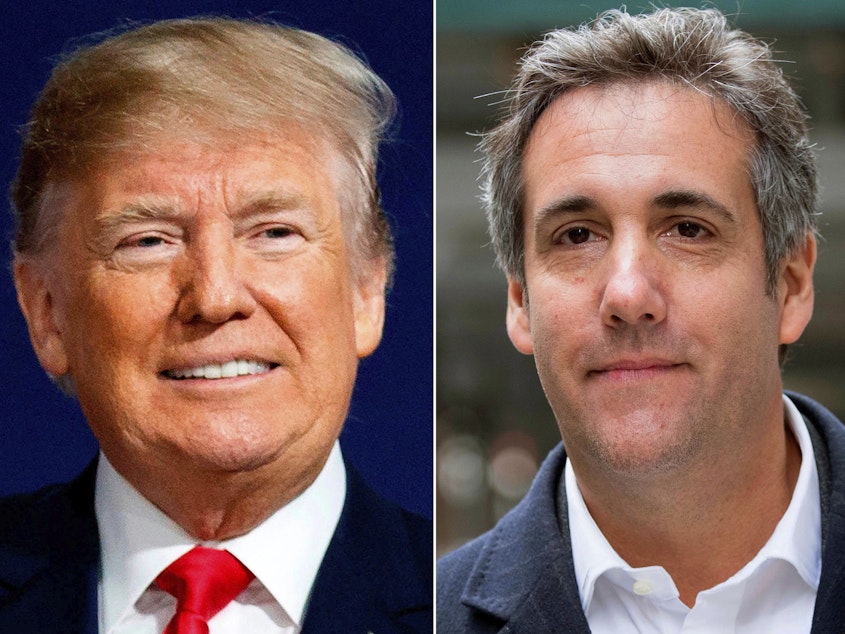Trump Spoke With Cohen As They, Aides, Sealed Hush Money Deals In 2016

Donald Trump took part in phone calls with his then-personal lawyer Michael Cohen as the attorney and other aides scrambled to arrange hush payments to a woman in 2016 to buy her silence about an alleged sexual relationship with Trump.
Those details come from hundreds of pages of court papers — warrant applications, affidavits and other related materials — made public on Thursday.
Federal Judge William Pauley of the Southern District of New York ordered the documents unsealed after prosecutors said they had concluded their investigation into the scheme and any related campaign finance violations.
Cohen pleaded guilty to campaign finance charges related to payments made shortly before Election Day in 2016 to former Playboy model Karen McDougal and adult film star Stephanie Clifford, whose stage name is Stormy Daniels.
Cohen has said that he made the payments in coordination with and at the direction of Trump. Cohen is now serving a three-year prison sentence after he admitted that and other crimes in court.
Sponsored
Cohen remains the only person to be charged in connection with the payments, although two individuals struck non-prosecution agreements with the government in exchange for their testimony.
Inside the room
The court records released Thursday provide a behind-the-scenes look into how Cohen worked with executives from American Media Inc., the publisher of the National Enquirer tabloid, to make those payments and prevent news of Trump's alleged extramarital affairs from getting out ahead the election.
Team Trump was particularly desperate to keep a lid on the alleged affairs after news broke of the Access Hollywood tape, in which Trump uses crude language about touching women.
One section of a warrant application filed in April 2018 states that Cohen exchanged a series of calls, text messages, and emails with Trump, Clifford's lawyer, Keith Davidson, AMI's David Pecker and Dylan Howard, as well as Trump campaign press secretary Hope Hicks in the days after the Access Hollywood tape appeared.
Sponsored
"Based on the timing of these calls, and the content of the text messages and emails, I believe that at least some of the communications concerned the need to prevent Clifford from going public, particularly in the wake of the Access Hollywood story," wrote the FBI agent affidavit supporting the warrant.
The agent then details a flurry of calls on Oct. 8, 2018—one day after the Access Hollywood tape was revealed in The Washington Post. At around 7:20 P.M., the court papers say, Cohen received a call from Hicks.
"Sixteen seconds into the call, Trump joined the call, and the call continued for over four minutes," the court papers say.
The documents then describe a string of calls over the next hour that Cohen made to Hicks, Pecker, Howard and again Trump.
"At 8:03 p.m., about three minutes after ending his call with Pecker, Cohen called Trump, and they spoke for nearly eight minutes," the papers say.
Sponsored
After two more quick calls with Howard, Cohen received a text message from Howard that read: "Keith will do it. Let's reconvene tomorrow," referring to Clifford's lawyer, Davidson.
Cohen ultimately paid Clifford $130,000 to keep silent about her alleged extramarital affair with Trump. Trump then repaid Cohen with a series of checks drawn from accounts he controlled and which were controlled by his business; Cohen revealed copies of the checks to Congress in March.
AMI, meanwhile, also has admitted arranging a separate payment to McDougal in a so-called "catch-and-kill" arrangement to keep her quiet about her alleged relationship with Trump. [Copyright 2019 NPR]



